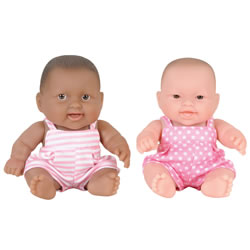5 Lots To Love Babies
Just like some adults have a more cheerful disposition than others, some babies seem hardwired to be happy. It doesn't take much to get a smile out of these infants, and they're usually as likely to flash a grin at a complete stranger as a family member. But what does it mean if your baby is super smiley? Is she destined to be an optimist for life? And is she really happier than other babies?

Product Title JC Toys Lots to Love Babies, 10' Hispanic Baby Average rating: 4.3 out of 5 stars, based on 6 reviews 6 ratings Current Price $14.62 $ 14. 62 - $19.95 $ 19. Here you will find my original patterns for the 5 inch Lots to Love Berenguer Babies. These babies can be purchased online at Annie's Attic. I do not mind anyone selling their finished product from my patterns. However, these patterns are copyright protected. They are for your personal use only. Lots to Love Babies 5' All Vinyl Dolls in Play House with Assorted Accessories. Lots to Love Babies and Carrier -14' $29.99.
- In another 'Aha!' Moment, I realized technology could assist parents with their 4th-trimester duties. So Happiest Baby invented SNOO, an innovative baby bed based on the 5 S’s that helps calm babies and ease them into sleep. Parents especially love when it quickly calms babies for those 2 a.m.
- Set your little one’s imagination free when you bring home the My Sweet Love 5 Inch Lots to Love Baby with Mini Accessories. This toy set includes all of the gear and accessories your son or daughter needs to occupy them for many happy hours.
Not necessarily. Contrary to what experts once believed, babies don't always smile simply because they're in a good mood.

'It’s important to remember that emotion doesn’t tie into a baby’s constant smiles,' NYC family psychologist Kathryn Smerling, PhD LCSW, tells Romper.

5 Lots To Love Babies
'Up until recent research revealed otherwise, we’ve always assumed that babies smiled in response to a genuine emotion they were feeling. But around 6 to 8 weeks, when a baby normally starts 'social smiling' as opposed to smiling as a reflex, she is responding to things that she can hear or faces she can see. She’ll typically smile in response to people, and less when she’s alone.'
So it could be that a very smiley baby simply has more people to smile at, or spends more time engaged with a caregiver. Even then, however, her smiles could be more calculated than you'd expect. In a study published in the journal PLOS One, researchers discovered that when babies smile, they have a goal: To make the person they're smiling at smile back. Fascinatingly, scientists also concluded that babies employ surprisingly 'sophisticated' timing to make their caregivers grin, smiling as little as possible to achieve their intended reaction.
5 Inch Lots To Love Babies
'If you've ever interacted with babies, you suspect that they're up to something when they're smiling. They're not just smiling randomly,' study author and research scientist Javier Movellan was quoted as saying in ScienceDaily.
In other words, yes, your smiley baby is a crafty little genius who's totally manipulating you. But what does the fact that she looks happy all the time now mean about her future, if anything?

While psychologists apparently used to think that our personalities later in life didn't have all that much to do with our temperaments as infants, more recent research suggests otherwise. One Russian study published in the journal Personality and Individual Differences, for example, found that babies who smiled more tended to be less neurotic when evaluated again at the age of 8, reported The BBC. Interestingly, though, babies who smiled more did not turn out to be more extroverted as children than others. So while an early tendency towards being smiley does seem to point towards some positive outcomes later on, just because your baby is generous with her smiles now doesn't guarantee she's going to grow up to be a social butterfly.

Either way, there don't appear to be any significant downsides to this trait. That said, in very rare cases, constant laughing and smiling can be a sign of Angelman Syndrome, according to Psychology Today, a rare genetic disorder which can also cause severe developmental delays, epilepsy, and other disabilities. (Don't freak out, though! As the site Angelman.org explains, this condition only occurs in one out of every 15,000 live births.)
Babies Love Books
In the vast majority of cases, parents of smiley babies have nothing to worry about.
'A baby always smiling isn’t anything abnormal,' says Smerling.
'It’s a learning process for them and they’re really just trying to process exactly what joy is, and how to share that joy with others around them that they’re gazing at.'
Basically, if you've got a particularly smiley baby on your hands, all you really have to do is smile back and enjoy it while it lasts!